Authored by Derrick Jackson & Co-Author Lisa Yu
Table of Contents
SSCP Certification Overview:
PayScale surveyed 553 SSCP certification holders in 2025. Average base salary: $84,000 (PayScale SSCP Salary Data). Not bad for a credential most people haven’t heard of.
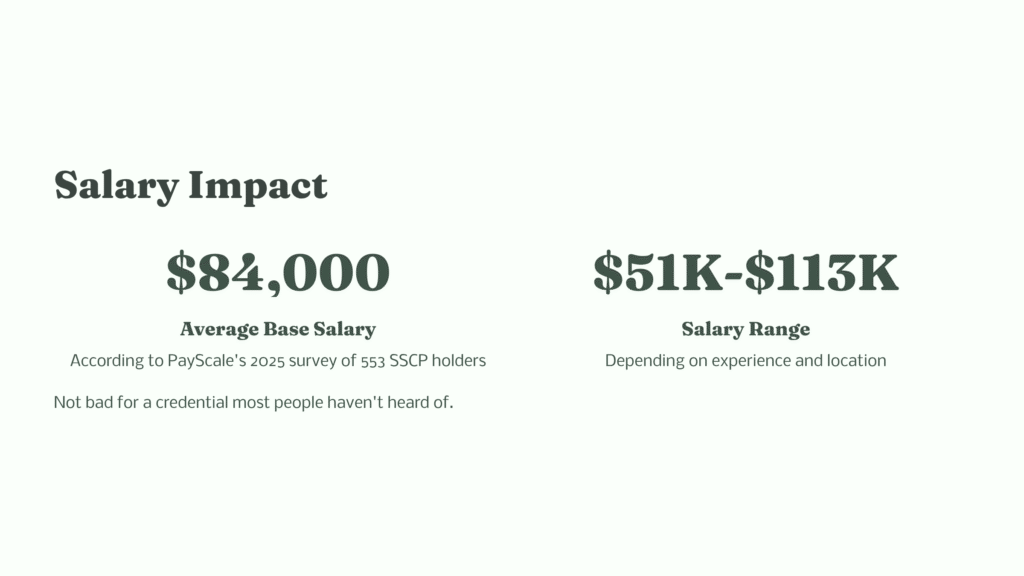
The Systems Security Certified Practitioner targets a specific niche. You’re not the CISO making boardroom presentations. You’re configuring firewalls. Managing user accounts. Investigating SIEM alerts. The SSCP validates these hands-on skills.
Over 10,000 professionals worldwide hold this certification as of September 2024 (ISC2 SSCP Updates). Small numbers compared to Security+ or CISSP, but that’s exactly the point. This cert doesn’t try to be everything to everyone.
Most cybersecurity certifications aim broad. The SSCP goes deep on operational skills. While others chase management roles, SSCP holders stay technical. They’re the ones who actually implement security controls, not just plan them.
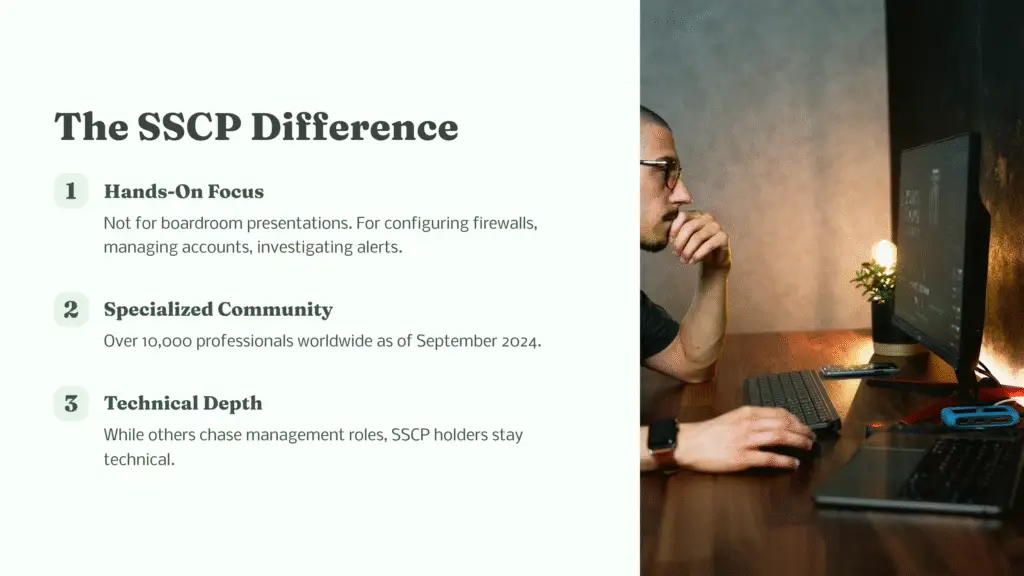
What’s the Deal with SSCP?
The (ISC)² Systems Security Certified Practitioner is a globally recognized credential designed to validate the advanced technical skills and operational knowledge of IT security practitioners (ISC2 SSCP Overview). It’s positioned as the premier certification for professionals responsible for hands-on implementation, monitoring, and administration of IT infrastructure.
(ISC)² introduced the SSCP in 2000 as their second certification, following the CISSP. The International Information System Security Certification Consortium created it specifically to address the need for a credential that certified the technical skills of professionals in systems and security administration career paths.
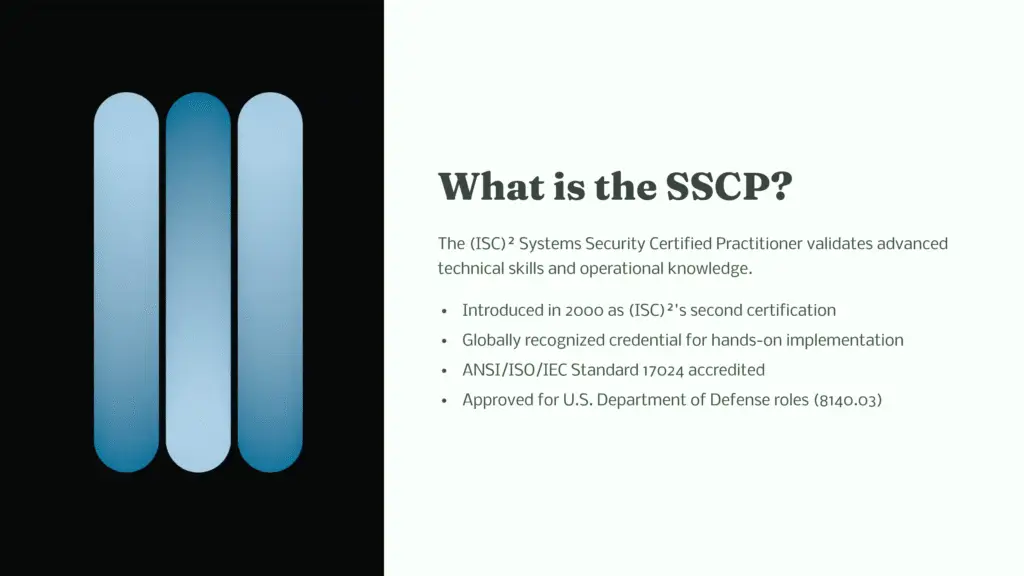
The organization carries serious weight in cybersecurity. Founded in 1989, (ISC)² is widely regarded as the world’s largest and leading membership association for cybersecurity professionals. Their global community exceeded 635,000 individuals across more than 175 countries as of 2023.
What makes the SSCP different? It’s explicitly for the technical professional on the front lines of cybersecurity. Unlike certifications that focus on high-level management, strategy, or auditing, the SSCP demonstrates an individual’s ability to execute operational security tasks.
The certification holds accreditation under ANSI/ISO/IEC Standard 17024, confirming quality, impartiality, and global recognition. More importantly for career prospects, it’s approved for U.S. Department of Defense roles under directive 8140.03 (Coursera SSCP Guide).
The SSCP occupies a specialized niche within the broader (ISC)² ecosystem. With over 10,000 certified professionals versus nearly 170,000 CISSP holders, it serves specific technical career paths rather than broad market appeal. This specialization is its strength, not weakness.
Who Should Look Into This?
The SSCP certification isn’t for everyone. It’s most beneficial for specific professional profiles who work directly with security technology daily.
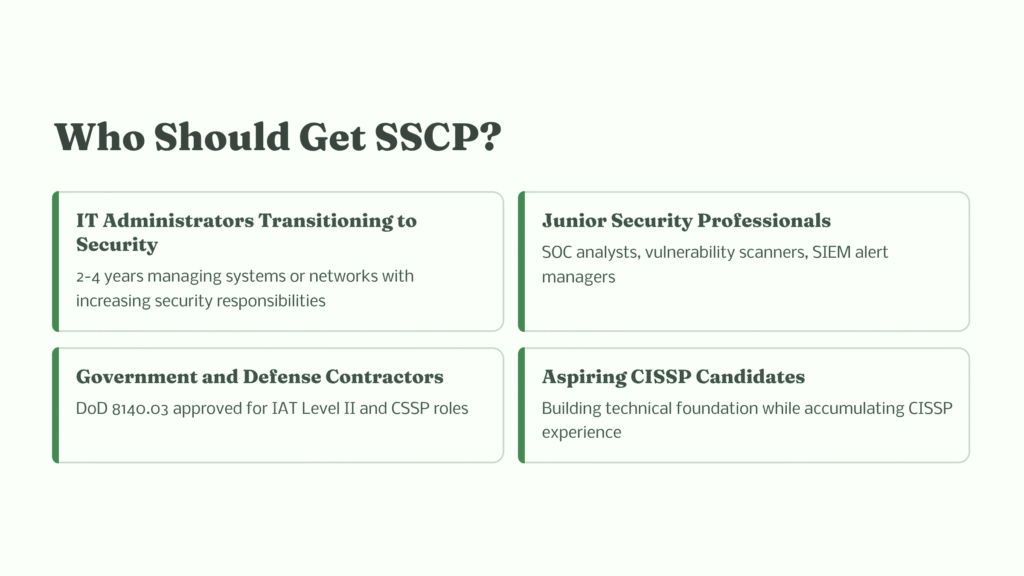
IT Administrators Transitioning to Security
You’ve been managing systems or networks for 2-4 years. Your responsibilities increasingly include security patches, user access management, and vulnerability remediation. The SSCP validates this transition from general IT to security-focused roles.
These professionals often find themselves caught between worlds. They understand technology but lack formal security credentials. The SSCP provides that bridge, demonstrating competency in security principles applied to technical infrastructure management.
Real-world scenario: A Windows administrator starts handling security group memberships and patch management. The SSCP certification validates they understand not just how to perform these tasks, but why security policies require specific approaches.
Junior Security Professionals
Working in a Security Operations Center (SOC)? Managing SIEM alerts? Conducting vulnerability scans? The SSCP is designed for security professionals who work with operational security (ISC2 SSCP Overview). It demonstrates understanding of technical foundations behind daily security activities.
These professionals often know their tools but want to validate broader security knowledge. The SSCP covers the “why” behind the processes they execute daily, from incident response procedures to cryptographic implementation.
The certification provides career advancement opportunities within technical security roles. Instead of moving into management, certified professionals can progress to senior analyst, security engineer, or specialized technical positions.
Government and Defense Contractors
Here’s where the SSCP really shines. The SSCP is approved by the US Department of Defense under DoDM 8140.03, earning this certification meets the minimum certification requirement for information assurance technical (IAT) Level II and cybersecurity service provider (CSSP) infrastructure support jobs (Coursera SSCP Guide).
For DoD contractors, this certification often functions as a hard requirement, not preference. The DoD 8140 directive maps specific certifications to required proficiency levels for defined work roles. The SSCP certification and its official training are approved for 36 distinct work roles within the DoD 8140 marketplace (ISC2 SSCP Updates).
This creates non-negotiable demand within the vast DoD ecosystem. Private sector employers might view SSCP and CompTIA Security+ as interchangeable, but DoD assigns them to different proficiency levels for specific positions.
Aspiring CISSP Candidates
Planning to pursue the CISSP but need experience first? The SSCP provides excellent technical foundation while accumulating the required five years for CISSP eligibility. It offers the (ISC)² brand recognition while building practical skills.
The Associate of (ISC)² pathway allows ambitious professionals to pass the CISSP exam first then accumulate experience, effectively bypassing SSCP. However, many prefer building technical foundations systematically before tackling the management-focused CISSP content.
Common career progression involves earning SSCP, gaining experience in technical security roles, then transitioning to CISSP for management opportunities. This path provides solid technical grounding for future strategic responsibilities.
7 Knowledge Domains: What You Need to Master
The SSCP exam is structured around seven domains, each weighted to reflect its importance in operational security (ISC2 SSCP Exam Outline). The broad spectrum of topics ensure relevancy across all disciplines in information security.
The domains aren’t academic concepts. They’re practical skills you’ll use daily in technical security roles.
Domain 1: Security Concepts and Practices (16%)
A key change in the September 15, 2024 version was renaming this domain from “Security Operations and Administration” to “Security Concepts and Practices,” reflecting broader foundational coverage.
Covers the (ISC)² Code of Ethics, core security principles (Confidentiality, Integrity, Availability), security control types (technical, physical, administrative), asset management lifecycle, and change management processes. This domain provides governance and operational context for all security activities.
Real-world application: Understanding why security policies require specific approaches, participating in change control boards, properly classifying and handling sensitive data, contributing to security awareness programs.
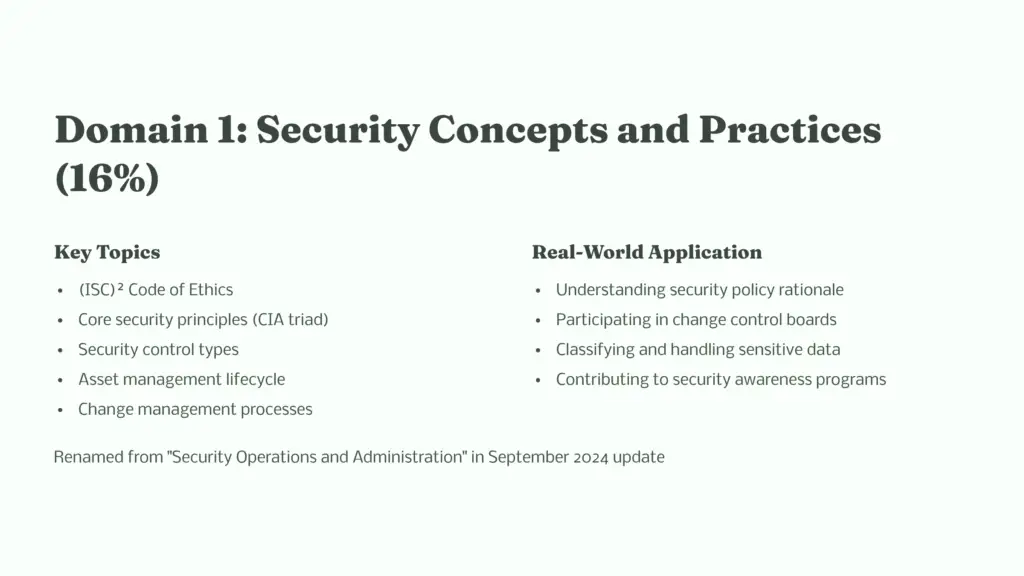
Domain 2: Access Controls (15%)
Focuses on mechanisms that enforce authorization. Includes authentication methods (Single/Multi-Factor Authentication, Single Sign-On), device authentication, identity management lifecycle (provisioning, de-provisioning), internetwork trust architectures (federated access using SAML, OAuth2), and access control models (Mandatory, Discretionary, Role-Based).
This represents core systems administrator daily responsibilities: creating and managing user accounts, assigning permissions based on least privilege, configuring authentication systems, ensuring authorized access to specific resources.
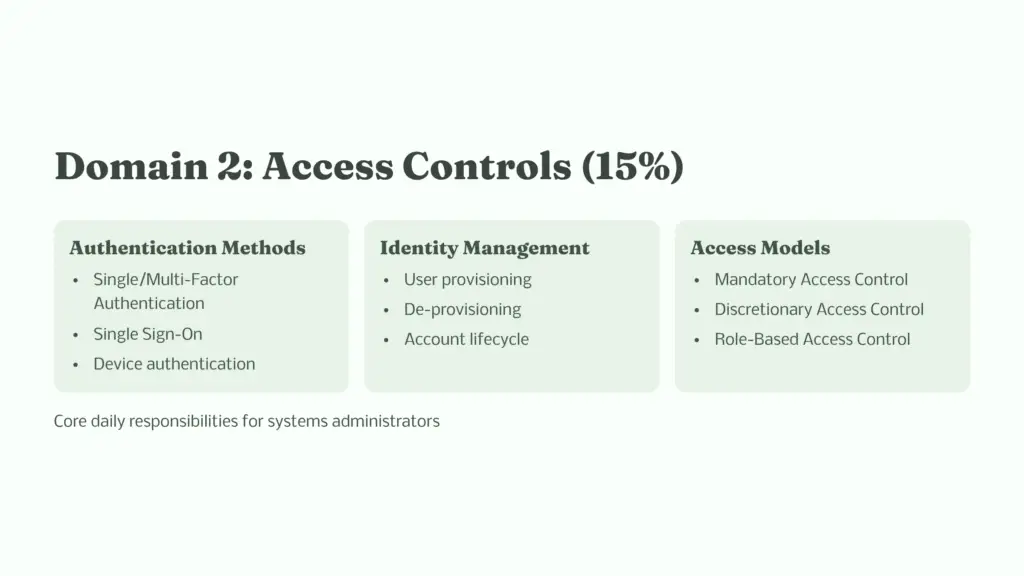
Domain 3: Risk Identification, Monitoring, and Analysis (15%)
Covers operational aspects of risk management. Includes risk management concepts (treatment, appetite, threat modeling), vulnerability management lifecycle (scanning, analysis, remediation), operating security platforms like SIEM systems, log management, and analyzing monitoring results.
Direct application for Security Analysts in SOC environments: using tools like Nessus or Qualys for vulnerability scanning, monitoring SIEM dashboards for alerts, analyzing logs for suspicious activity, escalating potential incidents.
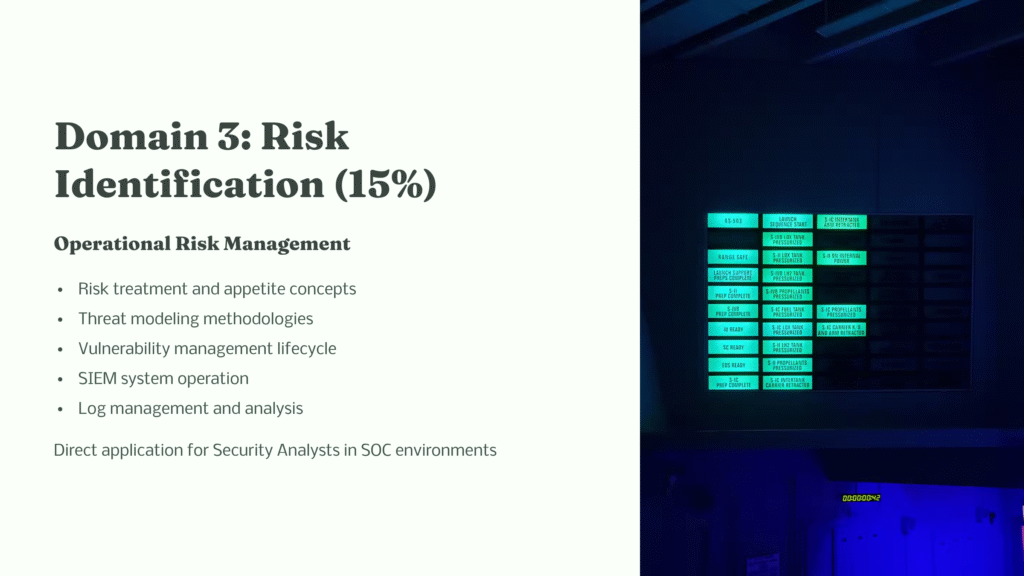
Domain 4: Incident Response and Recovery (14%)
Addresses security event response. Covers full incident response lifecycle per NIST and ISO frameworks (Preparation, Detection, Analysis, Containment, Eradication, Recovery), forensic investigation fundamentals (evidence handling, chain of custody), and Business Continuity/Disaster Recovery planning.
Practical knowledge for security breaches: correctly identifying and reporting incidents, containing threats without destroying evidence, preserving chain of custody for forensic analysis, assisting in system recovery.
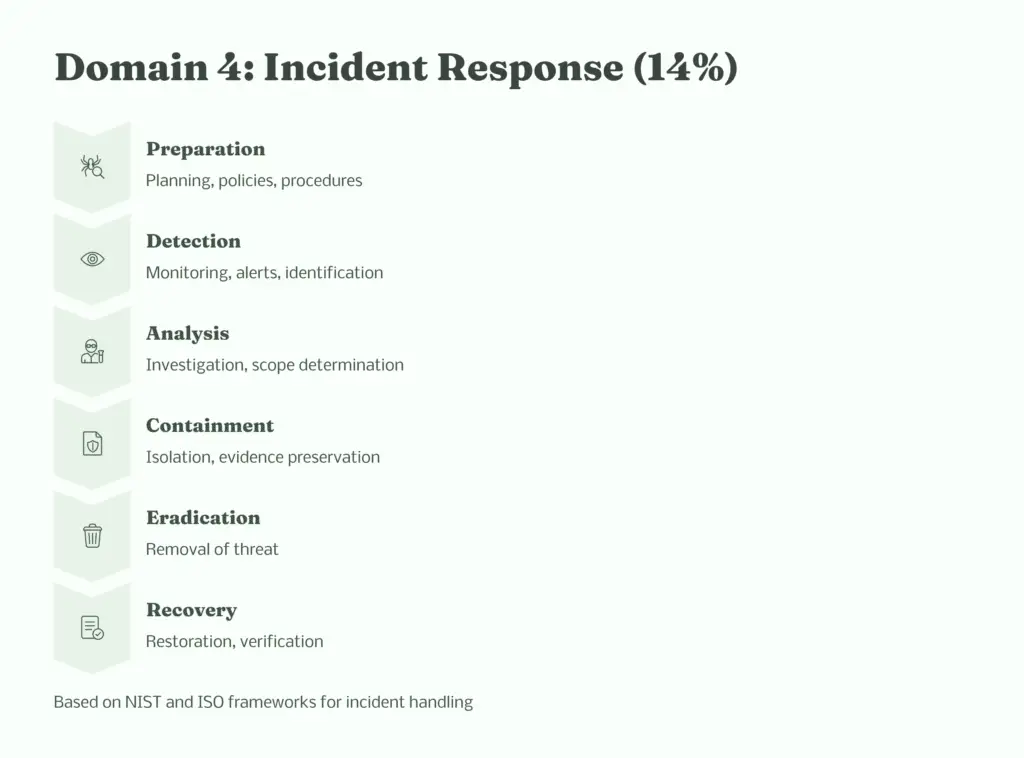
Domain 5: Cryptography (9%)
Most specialized technical domain covering cryptography application. Includes fundamental concepts (hashing, salting, symmetric/asymmetric encryption, digital signatures), secure protocol implementation (TLS, IPsec, S/MIME), and Public Key Infrastructure (PKI) including key management and certificates.
Implementation focus: setting up secure VPNs for remote access, enabling full-disk encryption on endpoints, managing digital certificates for web servers, using hashing for data integrity verification.
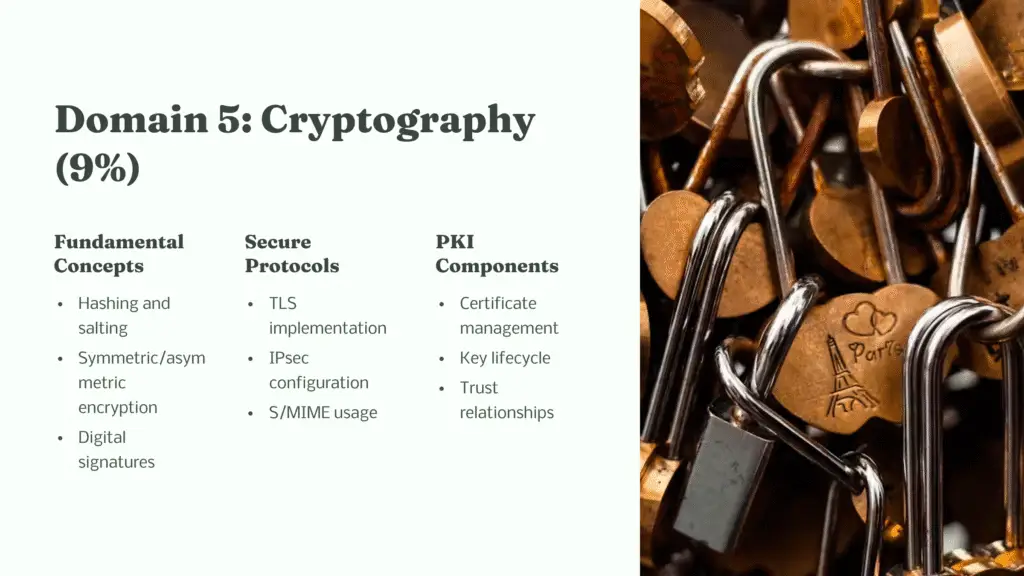
Domain 6: Network and Communications Security (16%)
Highest-weighted domain covering data-in-motion security. Includes networking fundamentals (OSI and TCP/IP models), network attacks (DDoS, Man-in-the-Middle), network security devices (firewalls, IDS/IPS, proxies), network segmentation (VLANs, DMZs), and wireless security protocols (WPA2/WPA3).
Primary domain for Network Security Engineers: writing and managing firewall rules, configuring switches and routers for security, hardening wireless access points, monitoring network traffic for attack indicators.
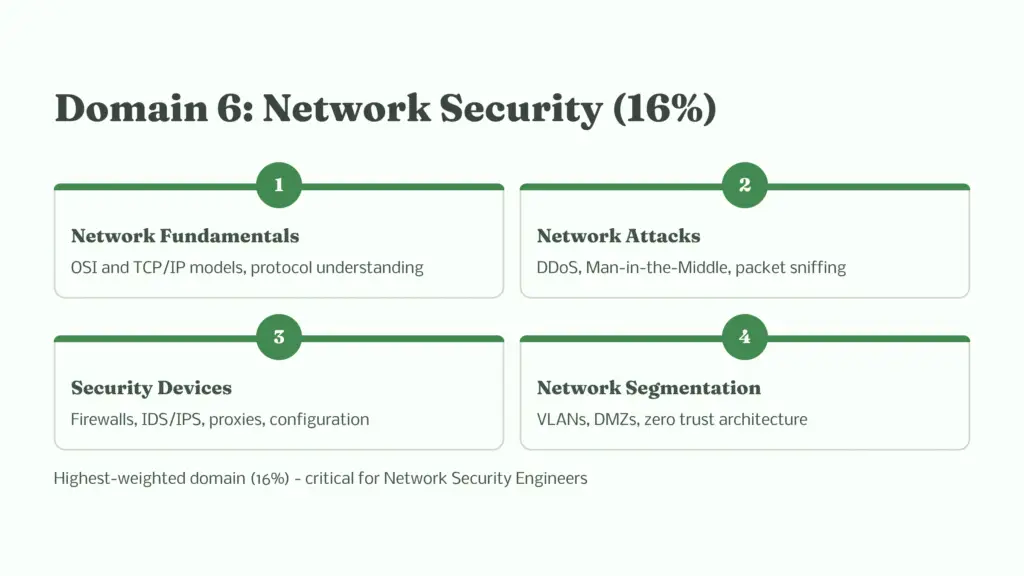
Domain 7: Systems and Application Security (15%)
Addresses endpoint and software security. Covers malicious code identification, endpoint security solutions (Host-based IDS/IPS, EDR), mobile device security (MDM, BYOD), cloud security concepts (IaaS, PaaS, SaaS, shared responsibility), and virtual environment security (hypervisors, containers).
Practical application: hardening operating systems, deploying and managing antivirus and EDR agents, applying security policies to corporate and personal mobile devices, extending security principles to cloud infrastructure.
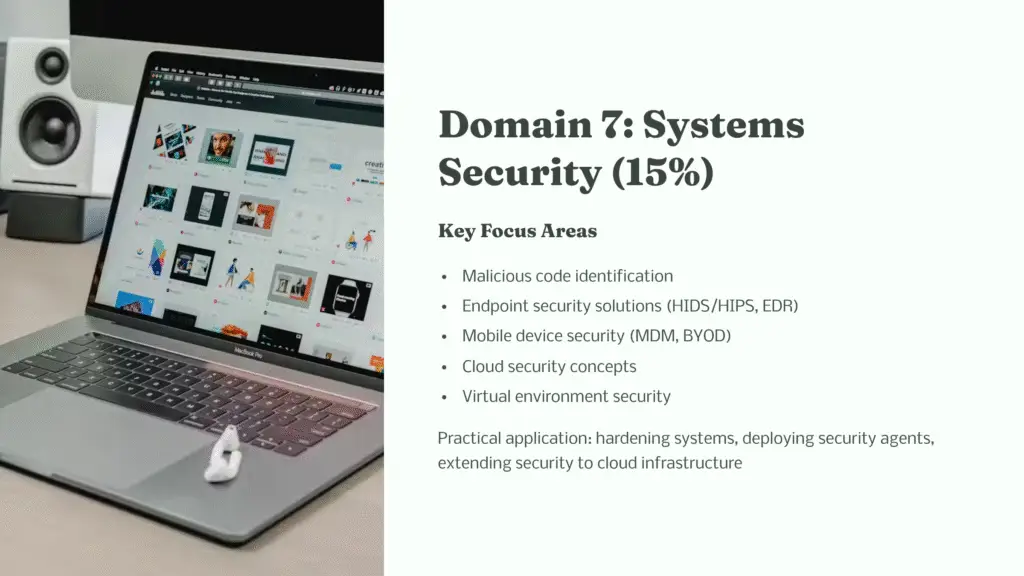
What to Expect From the Exam
The SSCP exam format is changing dramatically. Starting October 1, 2025, the CC, CCSP, and SSCP exams will be administered as a variable-length Computer Adaptive Test (CAT) exam only (ISC2 CAT Format Updates).
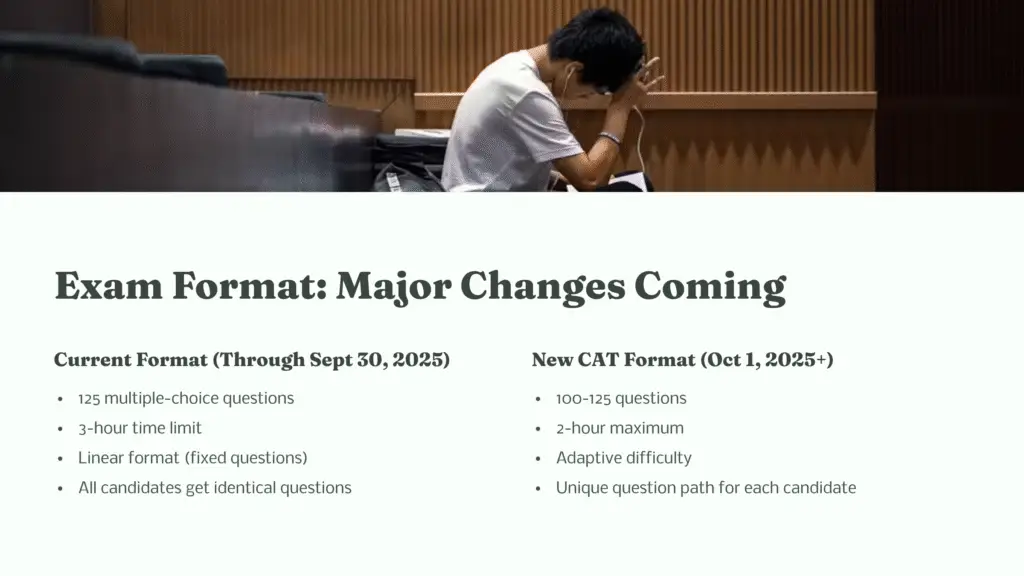
Current Linear Format (Through September 30, 2025)
The existing format includes 125 multiple-choice questions with 3-hour time limit (ISC2 SSCP Exam Outline). All candidates receive identical questions in same sequence. Completion requires answering all questions or time expiration.
New CAT Format (Beginning October 1, 2025)
SSCP will feature 100-125 questions with 2-hour maximum (ISC2 CAT Information). Each candidate starts with items well below passing standard. Following each response, the scoring algorithm re-estimates ability and selects next items targeting 50% probability of correct answers.
Exam ends when algorithm achieves 95% statistical confidence in pass/fail determination after minimum 100 items. The adaptive nature efficiently identifies knowledge gaps, requiring comprehensive preparation across all domains.
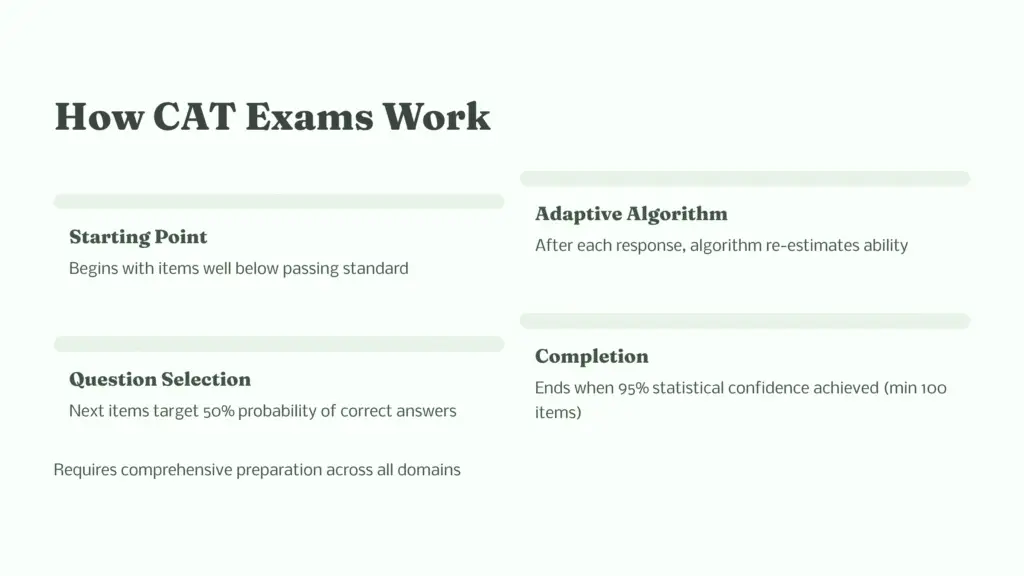
Scoring and Language Availability
Passing score: 700 out of 1000 points (Coursera SSCP Guide). Scores aren’t reported for passing candidates; failing candidates receive diagnostic feedback by domain.
Available languages: English, Japanese, and Spanish. All ISC2 certification exams are administered exclusively through Pearson VUE authorized testing centers worldwide.
Cost Breakdown
- Exam Fee: $249 USD (Coursera SSCP Guide)
- Retake Fee: $249 USD (full exam fee for each attempt)
- Annual Maintenance: $135 USD (ISC2 AMF Overview)
- Study Materials: $100-$2,500 USD range
Retake Policies
Maximum four attempts within 12-month period. Mandatory waiting periods: 30 days after first failure, 60 days after second failure, 90 days after subsequent failures. (ISC)² periodically offers promotional bundles like “Peace of Mind Protection” including second exam attempt at no additional cost.
Rescheduling fee: $50 USD. Cancellation fee: $100 USD. Changes cannot be made within 24-48 hours of scheduled appointment.
Career Impact and Salary Expectations
Multiple sources provide SSCP salary data, with variations reflecting different methodologies and sample populations.
Comprehensive Salary Analysis
PayScale reports $84,000 average base salary based on 553 certification holders, with salary range $51,000-$113,000 (PayScale SSCP Salary). This self-reported data from confirmed certification holders likely represents most accurate earning potential for qualified professionals.
ZipRecruiter shows $67,568 average annually, ranging $32,500-$109,000 (ZipRecruiter SSCP Salary). This job posting aggregation includes positions where SSCP is “preferred” rather than required, potentially including junior IT roles.
For dedicated security positions, expect higher salary ranges. According to industry analysis, SSCP-certified professionals can expect average salary of $81,000 annually (StationX SSCP vs CISSP).
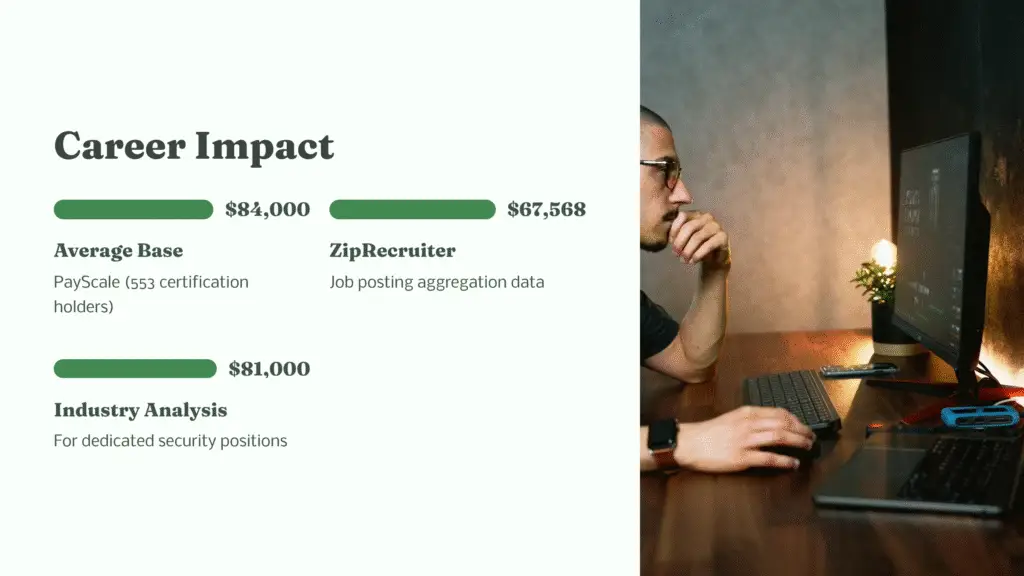
Experience Level Breakdown
Entry-level professionals (0-2 years): The 2024 (ISC)² Cybersecurity Workforce Study reports $86,000 average U.S. salary for entry- and junior-level respondents. ZipRecruiter places “Entry Level Cyber Security Analyst” national average at $99,400.
Experienced professionals (5+ years): PayScale data shows over half of SSCP holders are mid-career or experienced, with Security Engineer salaries reaching $122,000 and IT Security Administrator up to $110,000. (ISC)² reports $137,000 average for non-managerial, mid-advanced staff.
High-Demand Job Titles and Salary Ranges
Indeed analysis shows 1,378 jobs requesting SSCP certification (StationX SSCP vs CISSP). Common positions include:
- Security Analyst: $70,000-$90,000 average range
- Network Security Engineer: $130,000-$200,000 (591 Cert SSCP Guide)
- Security Administrator: Average $85,328 (591 Cert SSCP Guide)
- Security Engineer: Up to $136,792 (591 Cert SSCP Guide)
- Systems Administrator (Security Focus): $75,000-$95,000 typical range
Geographic Salary Variations
Major metropolitan areas command premium salaries. ZipRecruiter identifies cities where SSCP salaries exceed national averages: Nome, AK (24% above average), Berkeley, CA, and Sitka, AK (13-20% above average) (ZipRecruiter SSCP Salary).
U.S. Bureau of Labor Statistics data for Information Security Analyst roles shows top-paying states: New York ($138,730 average), California ($137,600), Maryland ($135,920), Virginia ($131,340).
Federal Government Opportunities
For U.S. federal employment, cybersecurity positions typically classify within GS-9 to GS-12 levels based on SSCP experience requirement. GS-12 base pay ranges $75,706-$98,422 in 2025, plus locality adjustments adding 18-38% depending on metropolitan area, bringing total compensation in line with private sector averages.
The DoD 8140 recognition creates unique career opportunities in federal contracting with structured pay scales and advancement potential.
Prerequisites and Experience Requirements

To be eligible for full SSCP certification, candidates must possess minimum one year cumulative, paid, full-time work experience in one or more of the seven domains of the SSCP Common Body of Knowledge (ISC2 SSCP Experience Requirements).
Qualifying Experience Standards
Experience must be directly related to information systems security work requiring application of security knowledge. Both part-time work (defined as 20-34 hours per week) and internships (paid or unpaid) can satisfy requirements, with specific hour-to-month conversion formulas provided by (ISC)².
The experience requirement ensures certified professionals have practical context for tested knowledge, differentiating SSCP from purely foundational certifications.
Educational Substitution Pathway
(ISC)² provides alternative path for candidates lacking required professional experience but having completed relevant formal education. Bachelor’s or master’s degree from accredited university in cybersecurity-related field can satisfy full one-year experience requirement (Coursera SSCP Guide).
Approved degree programs include Computer Science, Information Technology, Computer Engineering, and Management Information Systems.
Associate of (ISC)² Program
Candidates successfully passing SSCP exam without meeting experience requirement receive Associate of (ISC)² designation. Associates have two years from exam date to gain necessary experience and submit full certification application (Coursera SSCP Guide).
This program allows individuals to demonstrate tested knowledge while working toward hands-on experience mandate.
Endorsement Process Requirements

After passing exam and meeting experience requirement, candidates complete endorsement process within nine months of exam date. Application must be digitally endorsed by active (ISC)² certified professional in good standing who can verify candidate’s experience.
If candidate doesn’t know certified individual, (ISC)² can act as endorser. All members and associates must pledge to uphold (ISC)² Code of Ethics four mandatory canons: protect society and infrastructure; act honorably and legally; provide diligent service; advance the profession.
Preparation Strategy: How to Actually Pass
The SSCP exam is known for scenario-based question format, prioritizing application of knowledge over rote memorization. While candidates must understand theoretical underpinnings, exam questions test ability to analyze situations and select most appropriate courses of action.

Time Investment by Background
Recommended study time varies significantly based on candidate’s prior experience and knowledge:
- Experienced IT professionals with relevant certifications (CompTIA Security+ or several years security experience): 2-8 weeks focused review
- Career changers or newer professionals using SSCP as primary learning vehicle: 2-3 months consistent study, typically requiring 100-150 total study hours
Official (ISC)² Study Materials
Primary official resources designed to align directly with exam’s Common Body of Knowledge:
- (ISC)² SSCP Systems Security Certified Practitioner Official Study Guide, 3rd Edition by Mike Wills: Only study guide officially endorsed by (ISC)², designed to cover all exam objectives comprehensively (~$60 USD)
- (ISC)² SSCP Official Practice Tests, 2nd Edition by Mike Chapple and David Seidl: Hundreds of practice questions, essential for assessing exam readiness (~$42 USD)
- Bundle option: Both study guide and practice test book available for approximately $85 USD
Official Training Courses
(ISC)² offers official training in multiple formats:
- Online Self-Paced Training: Adaptive learning option with flexibility, priced $479-$595 USD for 180 days access
- Online Instructor-Led Training/Boot Camps: Live virtual courses led by authorized instructors, typically $1,875-$1,900 USD for 5-day programs, often including exam voucher
Third-Party Study Resources
Robust ecosystem of third-party providers offers high-quality, often more affordable preparation materials:
- Video Courses: Udemy offers SSCP courses with popular options like “SSCP Certification Complete Training Course” (4.4 stars from 486 reviews) costing $19.99-$79.99 USD during promotions
- Pluralsight: Dedicated learning path covering all seven domains, available through subscription model with free trial
- Alternative Study Guides: SSCP All-in-One Exam Guide by Darril Gibson, highly regarded for clear writing style
- Practice Platforms: LearnZapp offers official (ISC)² study app ($16.99/month to $139.99/year), CertPreps, CyberVista, and Pocket Prep frequently recommended for realistic exam simulations
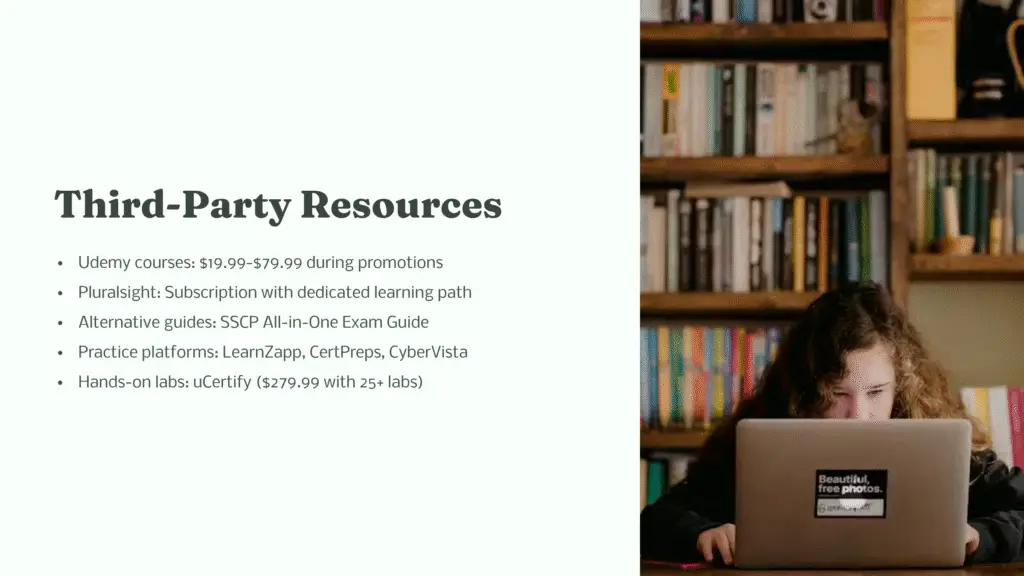
Hands-On Virtual Labs
For practical experience, platforms like uCertify offer SSCP course ($279.99 USD) including 25+ live labs for practicing skills like conducting vulnerability scans with Nessus, configuring VPNs, and creating router ACLs.
Proven Study Methodology
Successful candidates follow multi-faceted strategy:
- Foundation Building: Primary resource (official study guide or comprehensive video course) covering all seven domains
- Knowledge Reinforcement: Active note-taking, flashcards for key terms, acronyms, processes
- Practice and Assessment: Multiple practice exam sources to identify weak areas and familiarize with scenario-based questions
- Management Mindset: Think from risk-based perspective when answering questions, choosing options that best protect organization according to policy and best practices
Common mistake: thinking like technician instead of administrator. SSCP expects candidates to balance security, business needs, and organizational policies.
Recent Updates and What’s Changed
The SSCP maintains current relevance through regular updates based on industry job task analysis. (ISC)²’s triennial Job Task Analysis ensures exam content remains aligned with current industry practices.
September 2024 Domain Updates
Most recent update to SSCP exam outline became effective September 15, 2024. Primary change involved renaming Domain 1 from “Security Operations and Administration” to more encompassing “Security Concepts and Practices,” reflecting subtle but important shift toward foundational principles.
Domain weights and overall structure remained consistent, maintaining exam’s core focus while updating content emphasis.
Computer Adaptive Testing Transition
Significant evolution scheduled for October 1, 2025: SSCP exam will transition from current linear, fixed-form format to variable-length Computer Adaptive Test (CAT) format (ISC2 CAT Updates).
This change aligns SSCP’s testing methodology with more advanced CISSP, signaling move toward more precise and secure evaluation of candidate competency. CAT exams are more psychometrically precise and secure, as dynamic question selection limits exposure of any single exam item.
Technology Evolution Emphasis
Triennial analysis ensures domain content reflects current industry practices. Recent emphasis areas include:
- Cloud security concepts and hybrid infrastructure security
- AI/ML security considerations and automation
- Hybrid workforce security challenges
- Internet of Things (IoT) and operational technology convergence
Impact on Current Exam Takers
The CAT format represents (ISC)²’s long-term commitment to SSCP’s relevance and prestige in certification marketplace. For candidates, adaptive nature means preparation must focus on deep, comprehensive understanding across all domains rather than memorization strategies.
Enhanced exam security through adaptive questioning reinforces certification’s credibility and market value.
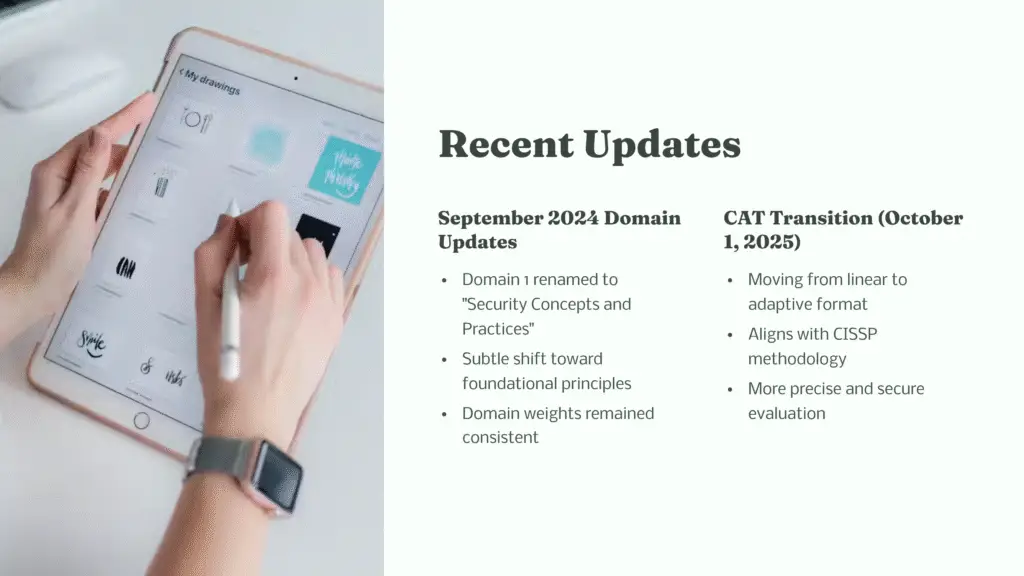
Is SSCP Worth It in 2025?
Absolutely, for the right candidate profile. The SSCP occupies a specific and important niche within cybersecurity credentialing landscape.
Where SSCP Excels
The certification’s primary strength lies in rigorous focus on hands-on technical skills, prestigious (ISC)² affiliation, and critical role in meeting U.S. Department of Defense workforce requirements.
For DoD contractors and federal employment, SSCP often functions as hard requirement rather than preference. The DoD 8140 directive creates non-negotiable demand within vast DoD ecosystem, making certification value immeasurable in regulated environments.
SSCP serves as powerful differentiator for practitioners wanting to prove proficiency in operational security administration. It validates technical expertise under prestigious (ISC)² banner, particularly valuable for roles requiring vendor-neutral credentials.
Market Position Analysis
While not as universally recognized as CompTIA Security+ for general entry-level positions, SSCP serves specific technical career paths effectively. The forthcoming CAT format transition elevates standing and reinforces reputation for quality and rigor.
The global cybersecurity workforce gap remains significant challenge, with worldwide shortage over 4.7 million professionals in 2024. Certifications like SSCP play crucial role addressing this gap by providing standardized mechanism for employers to identify and validate candidates possessing necessary operational skills.
Return on Investment Calculation
Initial investment ranges $500-$2,500 (exam plus materials). Annual maintenance requires $135 fee plus 60 CPE credits every three years. For professionals meeting target profile, particularly within defense industrial base, SSCP offers compelling return on investment.
Potential salary increases of $5,000-$15,000 annually combined with career advancement opportunities make certification cost recovery rapid. More importantly, it provides access to intermediate-level security roles otherwise unavailable.
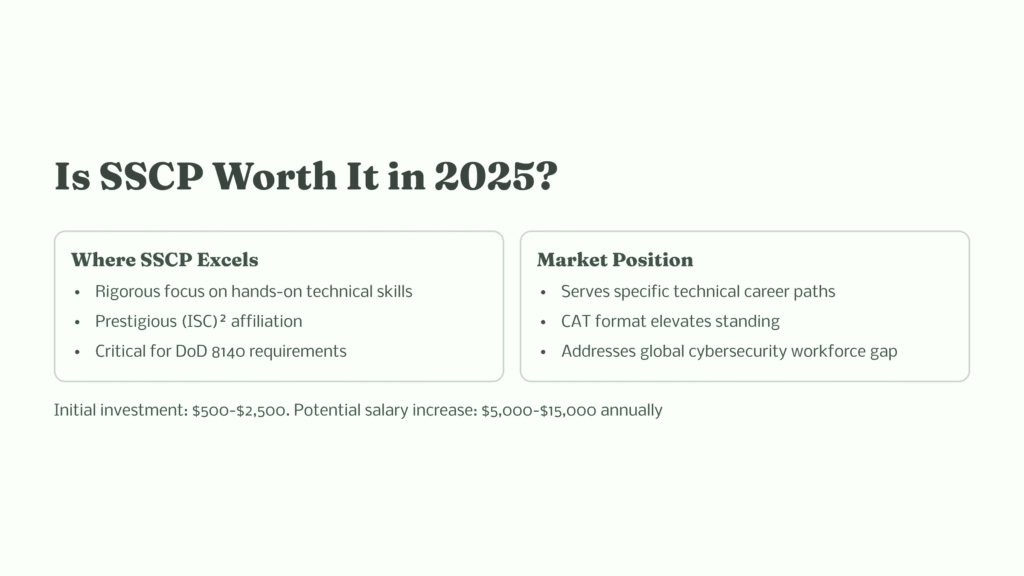
Scenarios for Maximum Value
SSCP delivers highest value for:
- IT professionals transitioning into dedicated security roles
- Junior security personnel seeking formal validation of expertise
- Government contractors requiring DoD 8140 compliance
- Technical practitioners preferring hands-on roles over management tracks
When Other Options Might Be Better
Absolute beginners without IT or networking experience should start with foundational certifications like CompTIA A+, Network+, or entry-level (ISC)² Certified in Cybersecurity (CC). Experienced managers and strategists with 5+ years experience should focus directly on CISSP rather than technical SSCP focus.
Getting Started: Your Next Steps
Ready to pursue SSCP certification? Here’s your practical roadmap following proven success strategies.
Step 1: Assess Current Knowledge and Experience
Review seven domain areas honestly against your professional background. Experience with 4-5 domains suggests readiness for focused preparation. If lacking significant experience in multiple domains, consider gaining practical exposure or starting with foundational certifications first.
Verify you meet minimum one-year experience requirement in SSCP domains, or hold qualifying degree for educational substitution pathway.
Step 2: Choose Study Approach Based on Budget and Learning Style
Select preparation strategy aligning with resources and timeline:
- Self-study budget approach: $100-$300 (official study guide, practice tests, third-party resources)
- Accelerated learning investment: $500-$1,900 (online courses, boot camps with instruction)
- Hybrid methodology: $300-$600 (official materials plus supplementary practice platforms)
Step 3: Create Realistic Study Plan
Develop timeline based on background:
- Experienced IT/security professionals: 6-10 weeks structured review
- Career changers or newer professionals: 12-16 weeks comprehensive study
- Part-time study schedule: 3-4 months consistent preparation
Plan 100-150 total study hours regardless of timeline compression.
Step 4: Register Strategically for Exam Format Preference
Critical timing decision based on format preference:
- Before October 1, 2025: Linear format option available for traditional testing approach
- After October 1, 2025: CAT format exclusively, requiring comprehensive preparation across all domains
Visit official registration: ISC2 Exam Registration
Step 5: Schedule Through Pearson VUE Network
After purchasing exam voucher from (ISC)², complete scheduling through Pearson VUE platform to select testing center, date, and time. Consider proximity, availability, and personal performance preferences for timing.
Step 6: Plan Beyond Certification Achievement
Consider strategic next steps for career advancement:
- Management track transition: CISSP for senior roles and strategic responsibilities
- Technical specialization depth: CCSP for cloud security, CySA+ for analyst focus
- Industry-specific credentials: Healthcare, financial services, or government-focused certifications
Leverage (ISC)² community membership for ongoing networking, continuing education, and professional development opportunities throughout career.

Conclusion & Resources
The SSCP represents more than certification achievement. It validates hands-on security expertise opening doors in growing cybersecurity field. For technical practitioners ready to formalize security knowledge under prestigious (ISC)² banner, it’s strategic career investment delivering measurable returns.
The upcoming CAT format transition reinforces certification’s long-term relevance and market position. Whether pursuing government contracting opportunities or technical security advancement, SSCP provides solid foundation for specialized career growth.
Start your certification journey at the official SSCP page and join the community of technical security professionals making real impact in cybersecurity operations.
Tech Jack Solutions specializes in helping IT professionals navigate certification pathways that accelerate career growth. Our comprehensive overviews provide strategic insights needed for informed professional development decisions. Connect with us for personalized certification planning and career advancement strategies.
Reference List – SSCP Certification Overview
Official (ISC)² Resources
- ISC2 SSCP Certification Overview
https://www.isc2.org/certifications/sscp - ISC2 SSCP Exam Outline
https://www.isc2.org/certifications/sscp/sscp-certification-exam-outline - ISC2 SSCP Experience Requirements
https://www.isc2.org/certifications/sscp/sscp-experience-requirements - ISC2 SSCP Updates – September 2024
https://www.isc2.org/Insights/2024/09/ISC2-Updates-SSCP-Certification-Exam-and-Training - ISC2 Computerized Adaptive Testing Information
https://www.isc2.org/certifications/computerized-adaptive-testing - ISC2 CAT Format Updates – May 2025
https://www.isc2.org/Insights/2025/05/computerized-adaptive-testing-examination-format-updates - ISC2 Annual Maintenance Fee Overview
https://www.isc2.org/policies-procedures/amfs-overview - ISC2 Exam Registration
https://www.isc2.org/register-for-exam - ISC2 Exam Scheduling
https://www.isc2.org/exams/schedule-exam
Salary and Compensation Data
- PayScale – SSCP Salary Research
https://www.payscale.com/research/US/Certification=System_Security_Certified_Practitioner_(SSCP)/Salary - ZipRecruiter – SSCP Education Certification Salary
https://www.ziprecruiter.com/Salaries/Sscp-Education-Certification-Salary
Industry Analysis and Career Information
- Coursera – What Is the SSCP Certification? 2025 Guide
https://www.coursera.org/articles/what-is-the-sscp-certification - StationX – SSCP vs CISSP Certification Differences
https://www.stationx.net/sscp-vs-cissp/ - 591 Cert – SSCP Certification Guide
https://591cert.com/sscp-certification/
Government and Defense Resources
- Global Knowledge – DoD 8140 Training Requirements
https://www.globalknowledge.com/us-en/content/government/dod-8140/
Additional Resources Referenced
- Thor Teaches – CAT Format for CC, CCSP, and SSCP
https://thorteaches.com/the-cc-ccsp-and-sscp-will-be-cat-format/ - Destination Certification – SSCP vs CISSP Analysis
https://destcert.com/resources/cissp-vs-sscp/ - The Knowledge Academy – SSCP Salary Expectations
https://www.theknowledgeacademy.com/blog/sscp-salary/ - Dumpsgate – SSCP Certification Worth and Market Analysis
https://dumpsgate.com/sscp-certification-worth/
Professional Organizations
- (ISC)² – International Information System Security Certification Consortium
https://www.isc2.org/ - Pearson VUE – Testing Centers
https://www.pearsonvue.com/
Last Updated: 08/13/2025. For the most current information, always consult official (ISC)² resources at https://www.isc2.org/certifications/sscp
About Tech Jacks Solutions: We provide comprehensive cybersecurity overview and certification guidance to help professionals advance their careers. Visit our website for more certification guides and training resources.

